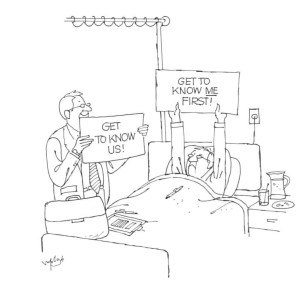The healthcare system is all about building patient engagement lately. Which makes me ask: if we get to engagement, will we ever get married? And if we do … will we wind up needing marriage counseling?
The healthcare system is all about building patient engagement lately. Which makes me ask: if we get to engagement, will we ever get married? And if we do … will we wind up needing marriage counseling?  Short answer: we already need marriage counseling, and we’re not even officially engaged yet. Herewith is the evidence that the doctor (and health system)-patient relationship needs marriage counseling,
Short answer: we already need marriage counseling, and we’re not even officially engaged yet. Herewith is the evidence that the doctor (and health system)-patient relationship needs marriage counseling, stolen adapted from a post on YourTango.com.
- You aren’t talking – Given the state of digital, or even analog, communication in healthcare, how can doctors and patients talk? Even when we’re in the same room, it’s conversation-us interruptus, given the whole 10 minutes we have for face to face interaction. And remember the last time you emailed your doctor with a question, and got an answer that day? Oh, right. That was the 14th of Never. Thank you, health IT infrastructure of doom, which is so dedicated to the security of our medical data that NO. ONE. CAN. SEE. IT.
- You see your partner as an antagonist – The healthcare system seems dedicated to keeping doctors and patients in an adversarial relationship. Doctors rat us out for our poor compliance in medication regimens without asking if we can afford said meds. Patients worry that their insurance premiums will go up if they tell the truth about stuff like smoking, or eating habits. Neither side seems capable of climbing off the “forces set in opposition” ledge. And the band plays on … getting less and less healthy in the process.
- You’re keeping secrets – See #2, and know that antagonists don’t share information well with each other. Doctors keep secrets from patients, i.e. how much treatment options will cost, with payers being fully indicted co-conspirators on that secret-stashing. Patients keep secrets, too, on stuff like cutting pills in half so that fiercely expensive medication will last twice as long. So we’re not talking, we’re forces set in opposition, and we’re keeping secrets. Next up, Divorce Court.
- You’re financially unfaithful – Doctors are keeping costs a secret (see #3, and it’s not really their fault, but still …), and patients aren’t being truthful about what treatment options they can afford, so they’re buying snake oil that Dr. Oz is pushing in the hope that it will work as well as the medication they can’t afford for their [insert condition here]. Which only guarantees bigger bills down the road. Everybody loses – money, health, lives – here.
- You’re living separate lives – No talking. Walled barricades. Secrets and lies. Money trouble. This relationship might as well be the Hatfields and the McCoys, or even the Russians and the Ukrainians. With 10 minute forced-march conversations, and little chance for touch-points in between, this isn’t a relationship, it’s armed camps on opposite banks of a wide river. Who speak different languages.
Can this marriage be saved? I – and a whole host of other folks – think it can, but it’s going to take some serious work. And, most importantly, a whole lot of support from the village we all – all of us, humanity at large – live in. We need to flip the entire relationship paradigm of healthcare on its head, and put patients and their doctors in charge of deciding what our relationship/marriage means. We have to be honest and transparent with each other. Lay down our arms, knock down the barricades, and reach out to each other for help and comfort. Let’s recommit to our relationship, shall we?







